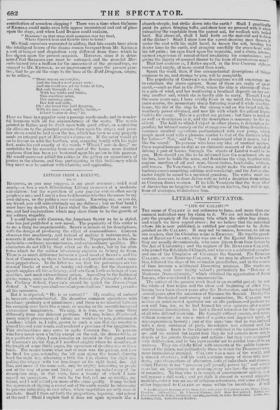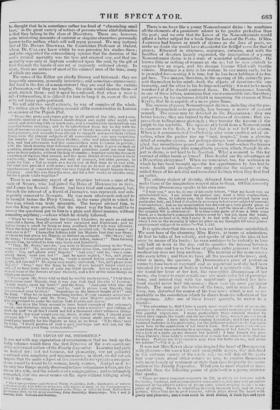" LIFE OF CALAMY."*
LITERARY SPECTATOR.
THE name of CALAMY is not unknown to fame, and more than one eminent individual may lay claim to it. We are not inclined to dis- pute the propriety of the running title which the editor has chosen, and which we have copied above; for we believe that the individual whwsh life is now published, is entitled par excellence to be distin- guished as the CALAMY. It may not be useless, however, to inform our readers, that his Christian name is EDMUND. He wasthe grand- son of EDMUND CALAMY, who was one of the Ejected Ministers (as they are usually denominated), who were driven from their livings by the Act of Uniformity; and the nephew of Dr. BENJAMIN CALAMY, who joined the Established Church, and who was a celebrated preacher and one of the Chaplains of CHARLES the Second. The EDMUND CALAMY, or our EDMUND CALAMY, if we may be allowed so to call him, followed the steps of his estimable grandfather, and in the course of time became a celebrated Dissenting minister. His works are numerous, and were highly valued ; particularly his "Defence of Moderate Nonconformity," which obtained the approbation of Jonsi Local, who considered it as unanswerable.
The author of the present work lived in an eventful period: he saw the whole of four reiwns and the close and beginning of other live, having been born eleven years after the Restoration, and having lived several years after the accession of GEORGE the Second. During tins time of theological controversy and commotion, Dr. CALAMY was neither an uninterested spectator nor an idle partisan,—if partisan we can call him, for, as he had formed his own opinions after a calm and rational investigation, he had a liberal toleration for the opinions of all who differed from him. He thought without passion, and wrote without rancour : he was a man of a gentle and impartial spirit, of uncompromising honesty ; and at the same time that he wasimlnled with a deem sentiment of piety, his relieion was rational and his charity large. Such is the character exhibited in the volumes bettors us; and we cannot but regret that they do not contain more amide details of his private thoughts and actions : but they were composed with deliberation, and he has been careful not to exhibit himself in an undress. They are chiefly filled with accounts of the public transac- tions of the times, and particularly those in which the Dissenters were more immediately engaged. CAL AMY was a man of the world, _and a shrewd observer ; and his work contains many of those little inci- dents, and observations of character, both of individuals and classes, which History in her "gorgeous pall proudly passes by," and wheel none but an eye-witness or contemporary can have the oppoetannY of recording. To him who is in search of entertainment merely, this will appear a dull work ; and yet cloth it abound in several amusing incidents,—for it was an ago of religious adventures, and some of them either happened to CALAMY or 'Came within his knowledge. It will .k An Historical Account of My Own Life, with some Ecilcetions on the Timei, I have Lived in. (1671-1721.) By Edmund Calamy, D.D. Now first punted. Edited and Illustrated with Notes, Historical and Biographical, by John Tuwill Butt. 2 vols. cvo• London, 1829, Colburn and Bentley. be thought that he is sometimes rather too fond of "chronicling small beer," in the great variety of notices of persons whose chief distinction is that they belong to the class of Dissenters. There are, however, some interesting accounts of eminent or singular characters personally known to the author, which will well repay perusal. We may instance that of Mr. HENRY DODWELL the Camdenian Professor at Oxford, whom Dr. CALAMY knew whilst he was pursuing his studies there ; and who supported the extraordinary opinion that the doctrine of the soul's natural mortality was the true and original one, and that im- mortality was only at baptism conferred upon the soul, by the gift of God through the hands of one set of regularly ordained clergy. In short, there are notices of most of the eminent men of the time, many of which are curious.
The notes of the Editor are chiefly literary and historical: they are frequently amusing, generally instructive, and sometimes unnecessary. But hard is the fate of commentators ! they are used like the victims of Procrustes,—if they are lengthy, the critic would shorten them—if short, stretch them : and it must be confessed, that when a man is full of information, it is difficult for him to keep it in, even at the risk of its not being quite pertinent. We will add two small extracts, by way of samples of the whole. The author gives the following account of he consternation in London on occasion of the Popish Plot "To see the posts and chains pot up in all parts of the city, and a con- siderable number of the Trained Bands drawn out, night after night, well armed, and watching with as much care, as if a considerable insurrection was expected before morning ; and to be entertained from day to day with the talk of massacres designed, and a number of bloody assassins ready to serve such purposes, and recruits from abroad to support and assist them (which things were the general subjects of all conversation,) was very surprising. The murder of Sir Edthund Bury Godfrey, (who had taken Oates's deposi-
tion, and had afterwards had free conversation with Coleman in private,) with the black Sunday that followed soon after it, when it grew so dark on a sudden, about eleven in the morning, that ministers could not read their notes in their pulpits, without the help of candles ; together with the frequent execution of traitors that ensued, and the many dismal stories handed about continually, made the hearts, not only of younger, but elder persons, to quake fur fear. • Not so much as a house was at that time to be met with, but what was provided with arms ; nor did any go to rest at night without apprehensions of somewhat that was very tragical that might happen before morning. And this was then the case, got for a few weeks or months only, but for a great while together."
There is an amusing report of an interview between a man of the name of STORY, who had joined the Duke of MONMOUTH in 16S5, and JAMES the Second. STORY had been tried and condemned, but, through the interest of a friend of JEFFREYS, was reprieved, and sub- sequently removed to Newgate. He was soon afterwards ordered to be brought before the Privy Council, in the same plight in which he
then was, which was truly miserable. The keeper advised him, in case the King were present, that the wisest way for him would be to answer the questions put to him in a plain and direct manner, without concealing anything ;—advice which he strictly followed.
" When he was brought into the Council Chamber, he made so sad and sorrowful a figure, that all present were surprised and frightened ; and he had so strong a smell by being so long confined, that it was very offensive. When the King first cast his eyes upon him, he cried out, Is that a man ? or what else is it ? ' Chancellor Jeffreys told his Majesty that that was Story, of whom he had given his Majesty so distinct an account. Oh ! Story,' says the King; • I remember him. That is a rare fellow, indeed ! ' Then turning towards him, he talked to him very freely and familiarly. " Pray, Mr. Story,' says he, you were in Monmouth's army in the West, were you not ? ' He, according to the advice given him, made answer pre- sently, ' Yes, an't please your Majesty.' And you,' said he, was a corn- ndsary there, were you not ? ' And he again replied, Yes, an't please your Majesty." And you,' said he, made a speech before great crowds of people, did von not?' He again very readily answered, Yes, an't please your Sinjesty' Pray,' says the King to him, if you haven't forgot what you said, let us have some taste of your fine florid speech. Let us have a speci- men of some of the flowers of your rhetoric, and a few of the main things on which you insisted.' " Whereupon Mr. Story told us that he readily made answer, I told them and it please your Majesty, that it was you that fired the city of London' 'A rare rogue, upon my word ! ' said the King. And pray what else did you tell them ?" I told them,' said he, and it please your Majesty, that
YOU poisoned your brother.' Impudence in the utmost height of it ! ' said the King. Pray let us have something further, if your memory serves you' '1 further told them,' said Mr. Story, that your Majesty appeared to be fully detsrmined to snake the nation both Papists and slaves.' "By {iris time the King seemed to have heard enough of the prisoner's speech ; and therefore, crs'ing. out, a rogue with a wit:se:Ss ! ' and cutting off short, he said. to all this I doubt not but a thousand other villanous things were added ; but what would you say, Story, if after all this, I should grant you your. life?' To which he, without any demur made answer, that he should pray heartily for his Majesty as long as he lived. Why then,' says the King, I freely pardon all that is past, and hope you will not, for the future, represent your King as inexorable' "



















 Previous page
Previous page